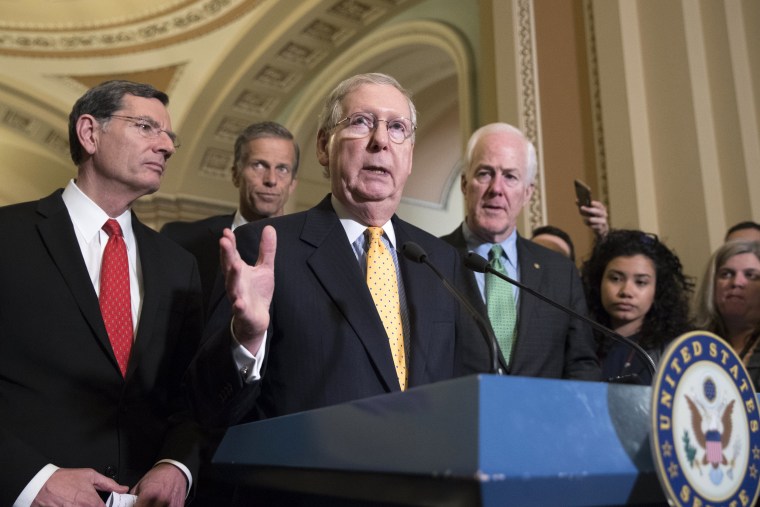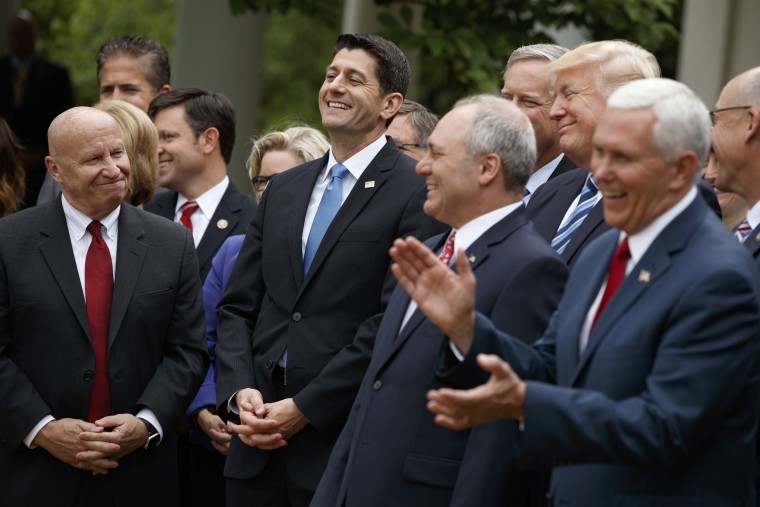WASHINGTON — Congressional Republicans began the year with a long and ambitious list of priorities that had been sidelined during eight years of President Barack Obama’s tenure. Five months in, the GOP policy agenda is lagging far behind their expectations. A slower-than-anticipated process of confirming President Donald Trump's nominees, the bruising effort to pass a health-care reform plan in the House and the ongoing controversy coming from the White House over expanding investigations into Russia have slowed any momentum the party had coming out of last year's election.
And time is not on their side. Congress has just seven weeks of work before the beginning of August when they take five weeks off to return to their districts. The fall legislative agenda will be filled with the battle over funding the government before the new fiscal year on October 1 — the one thing on their agenda that Congress is Constitutionally tasked with doing. And January begins another critical election year for lawmakers, making tough legislation even more difficult to pass.
With Congress out for the rest of this week, the president registered his opinion on the slow pace of progress, advocating for a change in Senate rules that would allow legislation such as tax reform and health care to pass with a simple majority.
Senate Majority Leader Mitch McConnell has repeatedly said he’s not interested in changing the Senate rules from the 60-vote threshold to pass legislation to a 51-vote majority. In addition, the two pieces of legislation Trump cited are attached to a rarely used legislative maneuver called reconciliation that already allows for those bills to pass with a simple majority.
As Congress heads into the summer months, here’s a progress report on the GOP agenda:
Repeal of Obamacare
Status Update: Despite promises from candidate Trump that he would repeal and replace the Affordable Care Act on his first day in office, the process has taken much longer. After fits and starts, the House has passed a bill that would reform the nation's health care system. The Senate is currently at work on taking that legislation and altering it but it's not happening rapidly.
Related: Senate GOP at Impasse on Health Care, but Will Push Forward Anyway
Outlook: While GOP senators repeatedly say they are putting no timeline on their effort, the reality is they must pass it before they leave town for their August recess in order to time for the House to vote on the measure again — as required by Congressional rules — and that must happen before the end of the fiscal year or else the vehicle to pass the measure, known as reconciliation, expires.
Tax Reform
Status Update: Trump has released a one-page outline on his broad vision for tax reform without specifics. Republican leaders in the House and the heads of relevant committees have been meeting with Trump adviser Gary Cohn and Treasury Secretary Steve Mnuchin to discuss details of an overhaul of business and individual taxes. While the work is being done behind the scenes, Republicans on the Hill admit that tax reform will not move forward until health care is done.
Outlook: In addition to timing, there’s disagreement between House and Senate Republicans on elements of tax reform. House Speaker Paul Ryan is pushing for a new corporate tax called the border adjustment tax, which would impose a tax on any product made overseas and coming into the U.S. Senate Republicans soundly reject the idea, saying that it would lead to a trade war. The administration has given mixed signals on the border adjustment tax.
The difficulty passing health care is slowing the momentum. Revamping the entire tax code is politically risky and with 2018 looming, it becomes more difficult. If tax reform doesn’t pass this year, it’s likely that comprehensive tax reform would be pared down to be a tax-cut bill.
Dodd-Frank
Status Update: Republicans have had their eye on either repealing the comprehensive Wall Street regulation legislation signed into law in 2010, or severely gutting it. A House Committee passed the Financial Choice Act out of committee, which is the first step in advancing legislation. The House could vote on it as early as next week.
Outlook: The Senate is less motivated to pass a repeal of the financial oversight legislation. The Senate committee has "no plans" to take up the House bill as of now, according to a Senate aide. Instead, the Senate is more interested in a broad-based bipartisan bill that focuses on economic growth and could include some financial regulation reform.
Infrastructure
Status Update: This was never one of Congressional Republicans’ priorities, but it was a top agenda item of the president. Congress has done little work on an infrastructure bill. In his budget, Trump outlined some broad strokes about an infrastructure plan that included $200 billion worth of federal funding.
Related: Trump Drama Imperils GOP Legislative Agenda
Outlook: With priorities shared by both Trump and Congress taking longer than anticipated, any movement on infrastructure will be almost entirely up to the White House. And amidst almost daily developments in the Russian investigations, spearheading a massive infrastructure bill beyond broad strokes will be difficult.
Appropriations Bills
Status Update: Congress is tasked with passing 12 funding bills before October 1. The House must pass the funding bills first before they are sent to the Senate. The House has yet to pass one of the appropriations bill.

Outlook: The appropriations process is often messy. Congress in recent years has rarely finished its work on time and has had to pass short-term spending bills that keep the government open until the House and Senate hash out the details of what it wants to fund or de-fund in the next fiscal year. Sometimes there’s a government shutdown if no agreement can be reached. We’re still months away from October 1, which in Washington, is an eternity, but the closer that date gets, the more Congress will scramble.
Regulatory Reform
Status Update: This is arguably the biggest success in the GOP agenda thus far. Republicans want to roll back regulations passed during President Obama’s term through executive order that they said stifled economic growth. Republicans passed 14 measures that undo Obama regulations, including a measure that protected waterways from coal mining runoff, a Dodd-Frank measure that forced oil and gas companies disclose information related to foreign governments, and a measure that banned states from drug testing unemployment insurance recipients.
A Senate Republican assessment says that the reduction of the regulations will “save taxpayers at least $3.7 billion and 4.2 million hours of paperwork.”
Outlook: The mechanism that Congress used to roll back the regulations has now expired. While Republicans will continue to reduce regulations throughout the economy, it will have to be done through the normal legislative procedure.

